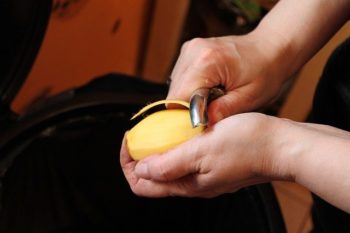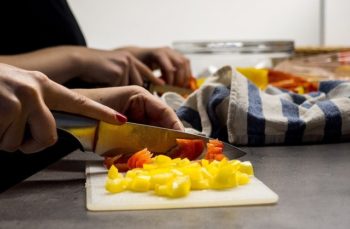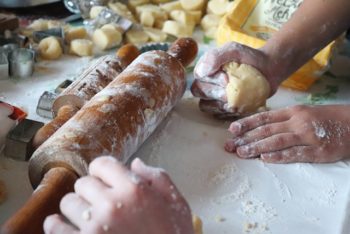Russian Cooking Verbs Posted by bota on Feb 4, 2021 in language, Uncategorized, Vocabulary
Last month we looked at Kitchen Appliances. Now it’s time to learn Russian verbs for cooking.
-
At the table
The general verb for eating is “ку́шать” [kushat’]. Similar to English, there are specifiс verbs for eating at different times of the day:
За́втракать [Zavtrakat’] – to have breakfast
Обе́дать [Obedat’] – to have lunch
Ужинать [Uzhinat’] – to have dinner
I’ve always considered “snacking” a very American thing, but there is a Russian verb “перекуси́ть” [perekusit’] that describes a quick bite.
The verb “заку́сывать” [zakusyvat’] means to follow up an alcoholic drink with a bite of food. Even the word for “appetizer” in Russian is “заку́ска” [zakuska].
When something smells deliciously appetizing, you can praise the hosts by saying:
“Как вку́сно па́хнет!” [kak vkusno pakhnet] – [it] smells delicious!
At the end of the meal, you can say “Я нае́лся” (masc.) or “Я нае́лась” (fem.) where “нае́сться” [najéstʹsja] means “to be full”.
-
Cooking
The most basic verb here is “гото́вить” or “гото́вить ку́шать” [gotovit’ kushat’] which means “to cook”.
Prepping verbs
Мы́ть [Myt’] – to wash
Разде́лывать [Razdelyvat’] – to carve
While “Чи́стить” [Chistit’] generally means “to clean”, it mostly refers to “peeling vegetable skin”, e.g., “почи́стить картошку” – “to peel potatoes.”
Тере́ть на тёрке [Teret’ na terke] – to grate
Доба́вить [Dobavit’] – to add
Насыпа́ть / насы́пать [Nasypat’] – to add (a dry ingredient)
Налива́ть [Nalivat’] – to pour (liquids)
Переме́шивать [Peremeshivat’] – to mix
Разогре́ть (в микроволновке) [Razogret’ (v mikrovolnovke)] – to heat (something) up in a microwave
Размора́живать [Razmorazhivat’] – to defrost
Слива́ть воду [Slivat’ vodu] – to drain
Посоли́ть [posolit’] – to salt
Поперчи́ть [poperchit’] – to pepper
Cutting
While English has individual verbs for the different ways something can be cut, the Russian verb наре́зать [narezat’] is the “umbrella” term that is followed up by the word specifying the style of the cut.
- Поре́зать [porezat’] – to chop, meaning to cut roughly into bite-sized pieces. This is the most casual and informal of the cutting styles.
- Наре́зать соло́мкой [solomkoi] – Julienne cut/ French cut
- Наре́зать кружка́ми [kruzhkami] – rondelle cut
- Наре́зать то́нко [tonko] – to slice
- Наре́зать то́нкими ле́нтами – Chiffonade cut
- Наре́зать до́льками – to cut into wedges (for oranges or apples)
- Шинкова́ть [Shinkovat’] – to shred (cabbage)
- Наре́зать ку́биками [kubikami] just means “to cube” so you should specify the size of the cubes:
- Наре́зать ме́лкими ку́биками [melkimi kubikami] – Brunoise cut
- Наре́зать сре́дними ку́биками [srednimi kubikami] – to dice
- Наре́зать кру́пными ку́биками – to cube
Cooking Methods
Вари́ть [Varit’] – to сook soups or something in a large amount of water
- Вари́ть су́п [sup] – to make soup
- Вари́ть макаро́ны [makaroni] – to cook pasta
- Вари́ть я́йца [yaytsa] – to make boiled eggs
- Вари́ть яйцо́ пашо́т – to make poached eggs
- Вари́ть на пару́ [na paru] – to steam
Томи́ть – to simmer
Пассерова́ть – to sauté
Туши́ть [Tushit’] – to braise
Жа́рить [Zharit’] generally means “to fry” but it has many variations:
- Жа́рить на гри́ле/готовить на гриле [na grile] – to grill
- Жа́рить на сковороде́ [skovorode] – to pan-fry (with minimum oil or fat)
- Жа́рить во фритю́ре [vo frityure] – to deep-fry
- Обжа́рить [Obzharit’] – to sear
Baking verbs:
Пе́чь means “to bake” or “to roast”. Baking refers to bread and sweets while roasting is generally about meats and vegetables, so you’ll just have to clarify what is cooking, e.g.
Я люблю пе́чь хле́б по воскресе́ньям. – I like to bake bread on Sundays.
Запека́ть инде́йку в тече́ние 3 ½ часов. – Roast the turkey for 3 ½ hours.
Сма́зать [Smazat’] – to grease
Посы́пать [Posypat’] – to dust
Раската́ть [Raskatat’] – to roll out
Украша́ть [ukrashat’] – to decorate
Лепи́ть [Lepit’] is a single Russian verb that covers the whole process of “making” and “forming” something out of dough and filling like пельме́ни [pel’meni] and ма́нты [manti]. When my mom says “пошли лепи́ть пельмени” (let’s go make pel’meni) she means:
1. spreading filling on the circle of rolled out dough.
2. folding the circle to create a half-moon.
3. pinching the dough along the curve of the half-circle.
4. pinching the corners together
Lastly, we should cover some verbs for when things are no longer safe to consume. Испо́ртиться [Isportit’sya] is an all-encompassing verb to express that something went bad. Ски́снуть [Skisnut’] covers dairy products that become sour and заплесневе́ть [zaplesnevet’] means a food item got moldy. Hopefully, you don’t have to use these verbs too often.
Прия́тного Аппети́та! [Priyatnovo Appetita!] – Bon Appetit!

Build vocabulary, practice pronunciation, and more with Transparent Language Online. Available anytime, anywhere, on any device.







